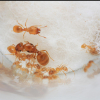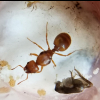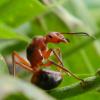- Formiculture.com
- Forums
- Gallery
- Members
- Member Map
- Chat

PSA: Pheidole tysoni is NOT polygynous!
Started By
CatsnAnts
, Aug 6 2020 5:58 AM
6 replies to this topic
#1
 Offline
-
Posted August 6 2020 - 5:58 AM
Offline
-
Posted August 6 2020 - 5:58 AM
Pheidole tysoni hasn’t been a very commonly kept species, until this year. I know of a few people that have multi-queen founding colonies right now, and were unsure if this species is polygynous or not. I just woke up this morning to my three queen colony having a massive brawl, one queen lost half of her limbs and I was able to save the other two before they were hurt. If you have this species in a multi-queen setup, make sure to keep a close eye on them (or just separate them), because mine didn’t even have pupae yet and they got very aggressive.
- TennesseeAnts, ANTdrew and Antkid12 like this
Spoiler
#2
 Offline
-
Posted August 6 2020 - 6:08 AM
Offline
-
Posted August 6 2020 - 6:08 AM
Pheidole tysoni hasn’t been a very commonly kept species, until this year. I know of a few people that have multi-queen founding colonies right now, and were unsure if this species is polygynous or not. I just woke up this morning to my three queen colony having a massive brawl, one queen lost half of her limbs and I was able to save the other two before they were hurt. If you have this species in a multi-queen setup, make sure to keep a close eye on them (or just separate them), because mine didn’t even have pupae yet and they got very aggressive.
My duo has workers and is doing fine so far...
- CatsnAnts likes this
My Main Journal | My Neivamyrmex Journal | My Ant Adoption | My YouTube
Join the TennesseeAnts Discord Server! https://discord.gg/JbKwPgs
#3
 Offline
-
Posted August 6 2020 - 6:21 AM
Offline
-
Posted August 6 2020 - 6:21 AM
Hmm, maybe it’s a local thing? I hope yours have more success than mine!My duo has workers and is doing fine so far...Pheidole tysoni hasn’t been a very commonly kept species, until this year. I know of a few people that have multi-queen founding colonies right now, and were unsure if this species is polygynous or not. I just woke up this morning to my three queen colony having a massive brawl, one queen lost half of her limbs and I was able to save the other two before they were hurt. If you have this species in a multi-queen setup, make sure to keep a close eye on them (or just separate them), because mine didn’t even have pupae yet and they got very aggressive.
Spoiler
#4
 Offline
-
Posted August 6 2020 - 6:25 AM
Offline
-
Posted August 6 2020 - 6:25 AM
Hmm, maybe it’s a local thing? I hope yours have more success than mine!
My duo has workers and is doing fine so far...Pheidole tysoni hasn’t been a very commonly kept species, until this year. I know of a few people that have multi-queen founding colonies right now, and were unsure if this species is polygynous or not. I just woke up this morning to my three queen colony having a massive brawl, one queen lost half of her limbs and I was able to save the other two before they were hurt. If you have this species in a multi-queen setup, make sure to keep a close eye on them (or just separate them), because mine didn’t even have pupae yet and they got very aggressive.
it could be, and thanks!
- CatsnAnts likes this
My Main Journal | My Neivamyrmex Journal | My Ant Adoption | My YouTube
Join the TennesseeAnts Discord Server! https://discord.gg/JbKwPgs
#5
 Offline
-
Posted August 6 2020 - 1:09 PM
Offline
-
Posted August 6 2020 - 1:09 PM
Pheidole tysoni hasn’t been a very commonly kept species, until this year. I know of a few people that have multi-queen founding colonies right now, and were unsure if this species is polygynous or not. I just woke up this morning to my three queen colony having a massive brawl, one queen lost half of her limbs and I was able to save the other two before they were hurt. If you have this species in a multi-queen setup, make sure to keep a close eye on them (or just separate them), because mine didn’t even have pupae yet and they got very aggressive.
Aw, man. I hope the other two do well!
- CatsnAnts likes this
Ants I have: Tapinoma sessile(2 queen colony). RED MORPH Camponotus neacticus(now has pupae!), Tetramorium immigrans (x3), Aphaenogaster sp, Temnothorax sp, Brachymyrmex sp. possibly infertile ![]() , Ponera pennsylvanica, and Pheidole morrisi!
, Ponera pennsylvanica, and Pheidole morrisi! ![]()
Other insects: Polistes sp. Queen
Ants I need: Pheidole sp., Trachymyrmex sp., Crematogaster cerasi , Dorymyrmex sp. Most wanted: Pheidole morrisii
#6
 Offline
-
Posted August 6 2020 - 1:56 PM
Offline
-
Posted August 6 2020 - 1:56 PM
Aw, man. I hope the other two do well!Pheidole tysoni hasn’t been a very commonly kept species, until this year. I know of a few people that have multi-queen founding colonies right now, and were unsure if this species is polygynous or not. I just woke up this morning to my three queen colony having a massive brawl, one queen lost half of her limbs and I was able to save the other two before they were hurt. If you have this species in a multi-queen setup, make sure to keep a close eye on them (or just separate them), because mine didn’t even have pupae yet and they got very aggressive.
Me too! I have the injured queen in a test tube with her fair share of the brood pile. Despite missing half of her limbs and an antennae, she still seems able to care for the brood. Hopefully, once the workers arrive they will be able to take care of her.
Spoiler
#7
 Offline
-
Posted August 6 2020 - 2:21 PM
Offline
-
Posted August 6 2020 - 2:21 PM
Polygyny in most ants seems to depends on the local population.
- TennesseeAnts and CatsnAnts like this
0 user(s) are reading this topic
0 members, 0 guests, 0 anonymous users















